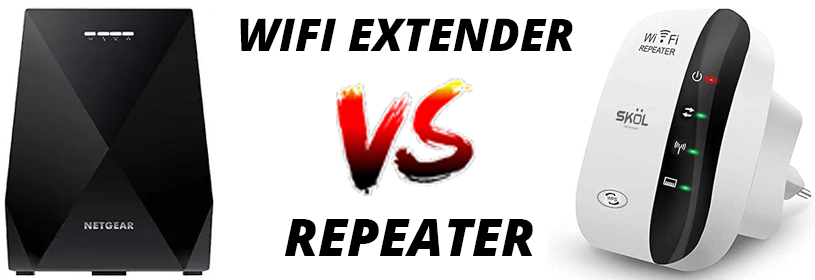With a spike in the use of internet connected devices, the need for lightening speed internet signals has also grown exponentially. We have devices in our homes that need an internet connection; however, garage doors, security cameras, light bulbs etc. that are outside also require internet to operate.
There comes a need to install access points outside the home. There are numerous devices that can help like a WiFi repeater or extender. But which one to buy? There is no clear idea about their differences. To solve this pain point, we jotted down the differences in this WiFi extender Vs repeater blog post.
WiFi Extender Vs Repeater: Differences Explained
Is a single WiFi router not sufficient to meet your internet needs? Are you having trouble getting WiFi signals in certain parts of your home? A wireless extender or repeater can be a solution for you. But how to decide which one is the best choice for you? Keep reading ahead to learn WiFi extender Vs repeater.
Let us tell you that WiFi extenders or repeaters or boosters are almost the same. Their sole purpose is to expand the existing network signal from the access point or the WiFi router. However, there are slight differences that differentiate one device from the second. Let’s understand the differences.
What is a WiFi Extender?
As the name suggests, a WiFi range extender is a device that’s used to improve the existing coverage range of the router. The extender gets WiFi signals from the main router and extends them further. This helps to increase the existing coverage range of the host router in the home.
The primary difference between the two devices in discussion is that the WiFi extender has a separate SSID that’s different from the router’s SSID. That means the extender works as a separate access point. Simply put, the extender gets WiFi signals from the router and rebroadcasts them further and the coverage range is increased.
A WiFi extender, also known as a wireless range extender, can be connected to the router with the help of a LAN cable (Ethernet or coaxial). The extender can also connect wirelessly. When it is connected to the router using a wired connection, it works like an access point. But when connected in a wired mode; it acts like a WiFi extender.

What is a WiFi Repeater?
A WiFi repeater works similarly as a WiFi extender. It receives the WiFi signals from the main router and repeats it further. The existing network range is thus increased. The primary difference here is that the repeater uses the same SSID or network name as the router. Hence, the devices that are connected to the router when on move automatically connect to the repeater’s network.
The WiFi repeaters connect to the main router without a LAN cable. Thus the setup is quite easier when compared to the WiFi extenders. Since the WiFi repeater connects wirelessly, the resultant signal may not be very good as the bandwidth may be reduced to half.
What’s Our Take, Which One to Buy?
By now you have a good idea about WiFi extender vs repeater. It completely depends on your personal requirements which device you want to go for. The area and number of devices to be connected are the major factors that will help you make the decision. The WiFi range extenders by Netgear are easy to set up. They also provide you the option of using the same SSID as the router. You can consider investing in wireless range extender by Netgear and use the IP address 192.168.1.250 to set them up easily with the home network.
But, if you have a bigger home and there are multiple areas where you need an internet connection, then you’ll need to install multiple repeaters or extenders. This is going to result in very poor signals. In such a scenario, you can consider giving a shot at mesh systems like the Orbi mesh WiFi system by Netgear. There are plenty others that are competent and can provide you get the desired WiFi network throughout the home. However, mesh systems are comparatively more expensive than WiFi repeaters or extenders.
The Closing Thoughts
This brings an end to our post on WiFi extender Vs repeater. We are sure that we have helped you by providing you with all the required information. By now you should have come to the conclusion on which product you would like to install in your home to widen the coverage range in your home. With the hope of helping you, here we wrap up our helpful blog post.


